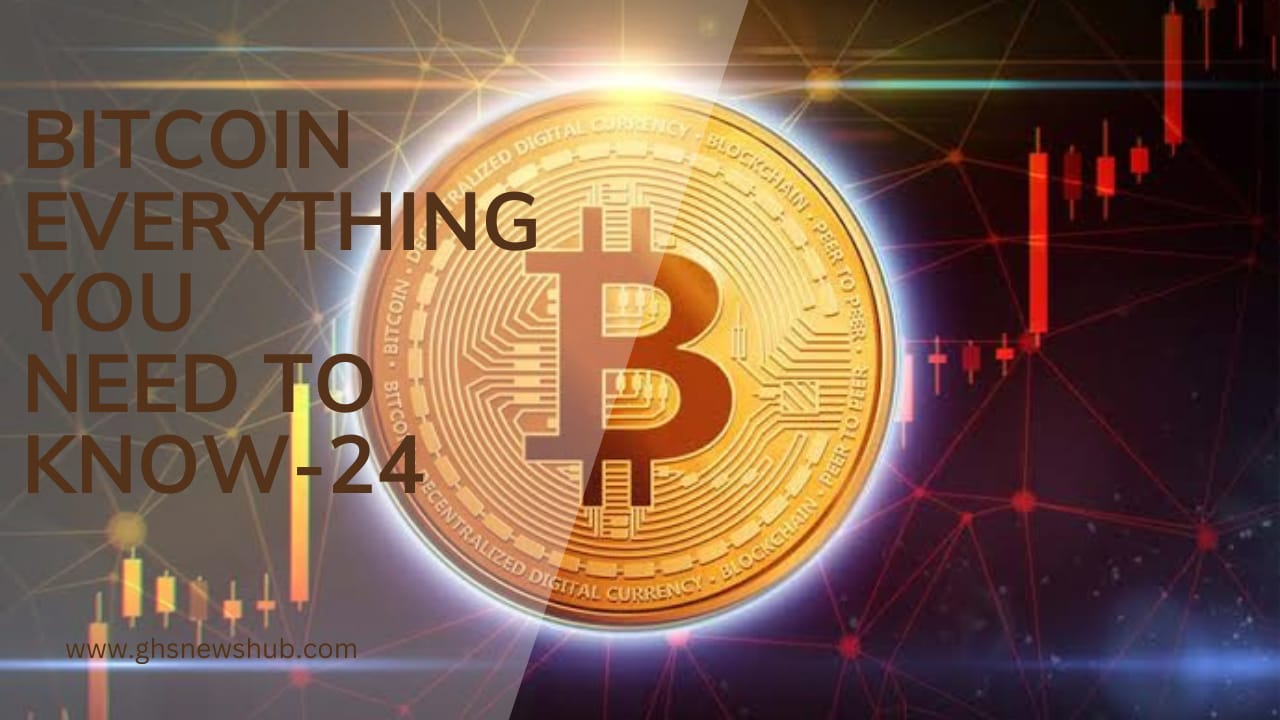Introduction
Bitcoin is a revolutionary digital currency that was created in 2009 by an anonymous individual or group known as Satoshi Nakamoto. It is the first decentralized cryptocurrency, to operate on a peer-to-peer network without the need for a central authority or intermediary. its significance lies in its ability to facilitate secure, borderless, and censorship-resistant transactions, challenging traditional financial systems.
Understanding Bitcoin Technology
At the core of Bitcoin lies blockchain technology, a decentralized and immutable digital ledger that records all transactions. The blockchain consists of blocks, each containing a record of multiple transactions. These blocks are secured through cryptography and linked together in a chronological chain, making it virtually impossible to alter records.
The process of verifying and adding transactions to the blockchain is known as mining. Miners compete to solve complex mathematical puzzles using specialized computing hardware. The first miner to solve the puzzle validates the transactions in a block and adds it to the blockchain, earning newly minted bitcoins and transaction fees as a reward.
Mining
Mining is a crucial component of the Bitcoin network, serving two primary functions, validating transactions and creating new bitcoins. Miners employ powerful computing resources to solve complex mathematical problems, and the first one to find the solution is rewarded with newly minted bitcoins and transaction fees.
it’s a competitive process, and the difficulty of the mathematical problems adjusts dynamically based on the total computing power dedicated to the network. This mechanism ensures that new blocks are added to the blockchain at a consistent rate, approximately every 10 minutes, maintaining the scarcity and controlled supply of bitcoins.
Digital Wallets
To store, receive, and send digital currency, users need a Bitcoin wallet. These wallets come in various forms, including hardware wallets (physical devices), software wallets (desktop or mobile applications), and paper wallets (printed private and public keys).
Securing private keys, which grant access to your bitcoins, is crucial. Best practices include using reputable wallet providers, enabling multi-factor authentication, and keeping backup copies of your private keys in a safe location.
Buying and Selling
There are several ways to buy and sell bitcoins, including cryptocurrency exchanges, peer-to-peer platforms, and Bitcoin ATMs. Popular exchanges like Coinbase, Binance, and Kraken allow users to purchase bitcoins using fiat currencies or other cryptocurrencies.
To send, you’ll need the recipient’s public address and a small transaction fee to incentivize miners to prioritize your transaction. The process is similar to transferring funds between traditional bank accounts but without the need for intermediaries.
Price and Market Trends

the price has been subject to significant volatility since its inception. Supply and demand dynamics, market sentiment, regulatory developments, and macroeconomic factors all play a role in influencing Bitcoin’s price movements.
Despite its fluctuations, it has experienced remarkable growth over the years, with its value increasing from a few cents in its early days to reaching all-time highs above $60,000 in 2021. Analyzing historical price trends and market dynamics can provide insights into Bitcoin’s potential as an investment asset.
Use Cases and Adoption
Bitcoin was initially envisioned as a peer-to-peer electronic cash system, but its use cases have expanded significantly. Many individuals and organizations now view it as a store of value, similar to digital gold, and a hedge against inflation.
Major companies, including Microsoft, AT&T, and Home Depot, have begun accepting digital currency as payment, while institutional investors and hedge funds have also allocated portions of their portfolios to Bitcoin. Initiatives like the Bitcoin Lightning Network aim to enhance its scalability and usability for everyday transactions.
Regulation and Legal Considerations
The regulatory landscape surrounding varies across jurisdictions. Some countries have embraced Bitcoin and implemented clear regulatory frameworks, while others have imposed strict restrictions or outright bans.
Taxation and compliance requirements for transactions and holdings are also evolving. It’s essential to stay informed about the latest regulatory developments and consult with legal and tax professionals to ensure compliance with applicable laws and regulations.
Community and Ecosystem
it has a vibrant and passionate community of developers, entrepreneurs, investors, and enthusiasts contributing to its growth and evolution. Notable events, such as the Bitcoin Conference and the release of the Bitcoin white paper, have become significant milestones for the community.
Within its ecosystem, numerous projects and initiatives are underway, ranging from scaling solutions to privacy-enhancing technologies. However, the community has also faced controversies, such as debates over block size limits and hard forks, which have led to the creation of new cryptocurrencies like Bitcoin Cash.
Future Outlook for Bitcoin

The future of Bitcoin remains uncertain, with both opportunities and challenges on the horizon. Scalability issues, such as increasing transaction throughput and reducing fees, are ongoing concerns that developers are actively addressing.
Technological advancements, like the Lightning Network and increased adoption of layer-2 solutions, could potentially enhance its usability and efficiency. Institutional adoption and mainstream acceptance could further drive its growth, while competition from other cryptocurrencies and potential regulatory crackdowns could pose challenges.
Pros
Decentralization
it operates on a decentralized network, free from control by governments or financial institutions, promoting financial freedom and censorship resistance.
Transparency
All transactions are recorded on the publicly distributed blockchain, ensuring transparency and preventing fraud or double-spending.
Borderless and global accessibility
it can be sent and received globally without the need for intermediaries, enabling seamless cross-border transactions.
Potential hedge against inflation
With a limited and controlled supply, it is often viewed as a potential hedge against inflation and a store of value, similar to digital gold.
Growing adoption and institutional interest
Major companies, institutions, and even some governments are embracing such digital currency, contributing to its legitimacy and mainstream adoption.
Cons
- its price is known for its extreme volatility, making it a highly speculative asset and potentially risky for investors or merchants.
- The network currently faces scalability issues, resulting in high transaction fees and slower confirmation times during periods of high demand.
- The process of mining consumes a significant amount of energy, raising environmental concerns about its carbon footprint.
- The lack of clear and consistent regulations across jurisdictions creates uncertainty and potential risks for businesses and individuals dealing with such digital currencies.
- While not inherently illegal, Bitcoin’s anonymity and decentralized nature have made it attractive for illicit activities like money laundering and cybercrime.
Read More
Final Words
Bitcoin’s journey from an obscure digital currency to a globally recognized asset has been remarkable. Its decentralized nature, immutable blockchain, and scarcity make it a unique and potentially disruptive technology.
While its future remains uncertain, its impact on the financial landscape is undeniable. As the cryptocurrency ecosystem continues to evolve, Bitcoin’s role as a pioneer and a catalyst for innovation will likely shape the future of money and finance for years to come. For more latest updates read more here.
FAQs
What is Bitcoin, and how does it work?
Bitcoin is a decentralized digital currency that operates on blockchain technology. It allows for secure peer-to-peer transactions without the need for a central authority like a bank. Transactions are verified and recorded on the blockchain by a network of computers (miners) through a process called mining.
How can I buy and store bitcoins securely?
You can buy it from cryptocurrency exchanges like Coinbase, Binance, or Kraken, or through peer-to-peer platforms. To store them securely, use a reputable cryptocurrency wallet, which can be a hardware wallet (physical device), software wallet (desktop or mobile app), or paper wallet (printed private and public keys). Enabling two-factor authentication and keeping backups of your private keys is essential.
What factors influence Bitcoin’s price volatility?
its price is highly volatile due to its limited supply, speculative trading, and fluctuations in demand. Market sentiment, regulatory developments, adoption rates, and macroeconomic factors like inflation also impact its price movements.
What are the real-world use cases of Bitcoin?
While initially intended as a peer-to-peer electronic cash system, it’s now widely used as a store of value (digital gold) and a hedge against inflation. Many businesses, including Microsoft, AT&T, and Home Depot, accept it as payment. It also has potential applications in remittances and cross-border transactions.
How is Bitcoin regulated, and what are the legal considerations?
Regulatory frameworks for Bitcoin vary across jurisdictions. Some countries have clear regulations, while others have imposed restrictions or bans. Taxation and compliance requirements for transactions and holdings are also evolving. It’s crucial to stay informed and consult legal and tax professionals.




Pingback: Digital Currencies | The Future Of Money-24 - GHS News Hub